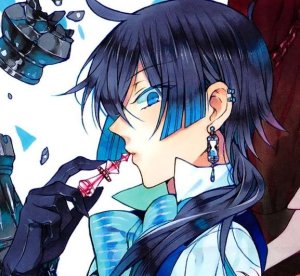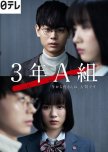This was a really really good drama, which was to me very successful, until I became increasingly more aware of how fast it had aged in such little time. It doesn’t ruin it for me, but it’s a very important thing to discuss, so I decided to write a review, even if maybe it’ll go unnoticed, considering how late I am to this.
Since this is a thriller-suspense in part, every episode has its plot twists and reveals, so I’m going to keep it as spoiler-free as possible, but even though I’ll remain vague to specifics, know that there’s little you can do spoiler-wise with this one if you want to have a fully-fleshed review.
I like to refer to this drama jokingly as “Gokusen with explosions”. Still, it actually blends three genres of drama, which don’t tend to mix well, and does so very seamlessly: high school drama, thriller and tokusatsu.
The entire plot is set on the thriller, it has a really good grasp of its narrative and it really immerses you in from episode one. Some reveals aren’t too unexpected, but that doesn’t really ruin the watching experience, since they’re thought through and well-written, for the most part.
The high school drama is a genre that I don’t tend to gravitate much towards unless there’s some catch, and this one has that. The development of the students and their issues is more into the realms of something like 12 Suicidal Children (albeit here it’s better written) than something like Dragon Zakura or Gokusen. Not every issue is developed as much as it could, but this drama takes its issues more seriously and with much more intensity than your typical high school drama would.
The tokusatsu aspect is used here as a sort of allegorical parallel that works super well. You end up finding out how it works and why it’s there as you go along with the plot, and to me it was a really fantastic addition. I am a sucker for well used archetypes and this drama really knew what it was doing.
Related to that, there are few actors that could have taken the lead as well as Suda Masaki did. I was initially reticent because I would have thought his character older, but he has the right experience in all the genres this drama is made out of (thriller? check, high school dramas with a twist? check, tokusatsu? double check) and it absolutely shows in his performance.
I have smaller nitpicks here and there with how some of the characters were handled and how some tropes were used but my biggest qualm with the drama is, like I said, that it sadly aged immensely in the past year since it’s been out.
Here I'll be delving into some mild spoilers, I wont specify how this comes into play but a subject matter present in the drama will be discussed.
One of the many things portrayed in this drama is related to cyber-bullying, social media and suicide. In the last months we’ve had more than one case of this happening in the Japanese media industry. More than one. Not an isolated event, this is a huge problem.
The drama uses that to bring across a discourse of responsibility and taking accountability for your actions, which is really good, and it does a good job using the theme of empathy and change. It does base its premise in maturing and learning while putting ourselves in the other person’s shoes. It has a good aim and a realistic approach in which solutions could be found in small personal changes.
However.
There is something that is mentioned, used and described in the drama that gets zero attention when it should be paramount in this sort of premise: mental health.
The drama uses mental illness in different important ways for the plot, and even though it showcases it and sets it as something important, it does not develop the lack of proper care of it and the lack of conversation about it as one of the key parts of society’s failure towards the subject matter discussed.
I know that in jdramas that doesn’t tend to be expected and that I have to put myself in the place of the social environment these dramas come from, but some things are not culturally specific, some things are universal, and mental health care should be.
Maybe last year, when the world was in a different place, it was easier for the regular audience to dismiss it and move along and just stay with the sometimes really shallow rant of “people+social media=bad”. Sadly, we should know better now, and this drama has aged faster than anyone expected.
If the drama had not mentioned it, had not even included it, I would have thought it an overlooked element but not been as disappointed, but it is a very important part of its plot for more than one character, and I can’t help thinking that it reflects the missing conversations that society should be having on the subject of mental health care and the neglect, shame and overall silence these themes are seen by in regular media.
The lack of proper attention to these subject matters and the absolute lack of accessibility to proper mental health care, not only out of money and means but out of a social stigma that prevents people from reaching out to professional help when needed, is a key element of this storyline and it is sadly not there.
As of September of 2020, in the Japanese industry, it has become more glaringly obvious than ever.
Overall, the drama is very very good and I recommend it highly for those seeking a good thriller and a very emotional and deep type of drama about learning and growing up. It’s sad that the subject matter is so painfully relevant that reality has surpassed its premise with heartbreaking impact.
Since this is a thriller-suspense in part, every episode has its plot twists and reveals, so I’m going to keep it as spoiler-free as possible, but even though I’ll remain vague to specifics, know that there’s little you can do spoiler-wise with this one if you want to have a fully-fleshed review.
I like to refer to this drama jokingly as “Gokusen with explosions”. Still, it actually blends three genres of drama, which don’t tend to mix well, and does so very seamlessly: high school drama, thriller and tokusatsu.
The entire plot is set on the thriller, it has a really good grasp of its narrative and it really immerses you in from episode one. Some reveals aren’t too unexpected, but that doesn’t really ruin the watching experience, since they’re thought through and well-written, for the most part.
The high school drama is a genre that I don’t tend to gravitate much towards unless there’s some catch, and this one has that. The development of the students and their issues is more into the realms of something like 12 Suicidal Children (albeit here it’s better written) than something like Dragon Zakura or Gokusen. Not every issue is developed as much as it could, but this drama takes its issues more seriously and with much more intensity than your typical high school drama would.
The tokusatsu aspect is used here as a sort of allegorical parallel that works super well. You end up finding out how it works and why it’s there as you go along with the plot, and to me it was a really fantastic addition. I am a sucker for well used archetypes and this drama really knew what it was doing.
Related to that, there are few actors that could have taken the lead as well as Suda Masaki did. I was initially reticent because I would have thought his character older, but he has the right experience in all the genres this drama is made out of (thriller? check, high school dramas with a twist? check, tokusatsu? double check) and it absolutely shows in his performance.
I have smaller nitpicks here and there with how some of the characters were handled and how some tropes were used but my biggest qualm with the drama is, like I said, that it sadly aged immensely in the past year since it’s been out.
Here I'll be delving into some mild spoilers, I wont specify how this comes into play but a subject matter present in the drama will be discussed.
One of the many things portrayed in this drama is related to cyber-bullying, social media and suicide. In the last months we’ve had more than one case of this happening in the Japanese media industry. More than one. Not an isolated event, this is a huge problem.
The drama uses that to bring across a discourse of responsibility and taking accountability for your actions, which is really good, and it does a good job using the theme of empathy and change. It does base its premise in maturing and learning while putting ourselves in the other person’s shoes. It has a good aim and a realistic approach in which solutions could be found in small personal changes.
However.
There is something that is mentioned, used and described in the drama that gets zero attention when it should be paramount in this sort of premise: mental health.
The drama uses mental illness in different important ways for the plot, and even though it showcases it and sets it as something important, it does not develop the lack of proper care of it and the lack of conversation about it as one of the key parts of society’s failure towards the subject matter discussed.
I know that in jdramas that doesn’t tend to be expected and that I have to put myself in the place of the social environment these dramas come from, but some things are not culturally specific, some things are universal, and mental health care should be.
Maybe last year, when the world was in a different place, it was easier for the regular audience to dismiss it and move along and just stay with the sometimes really shallow rant of “people+social media=bad”. Sadly, we should know better now, and this drama has aged faster than anyone expected.
If the drama had not mentioned it, had not even included it, I would have thought it an overlooked element but not been as disappointed, but it is a very important part of its plot for more than one character, and I can’t help thinking that it reflects the missing conversations that society should be having on the subject of mental health care and the neglect, shame and overall silence these themes are seen by in regular media.
The lack of proper attention to these subject matters and the absolute lack of accessibility to proper mental health care, not only out of money and means but out of a social stigma that prevents people from reaching out to professional help when needed, is a key element of this storyline and it is sadly not there.
As of September of 2020, in the Japanese industry, it has become more glaringly obvious than ever.
Overall, the drama is very very good and I recommend it highly for those seeking a good thriller and a very emotional and deep type of drama about learning and growing up. It’s sad that the subject matter is so painfully relevant that reality has surpassed its premise with heartbreaking impact.
Was this review helpful to you?





















